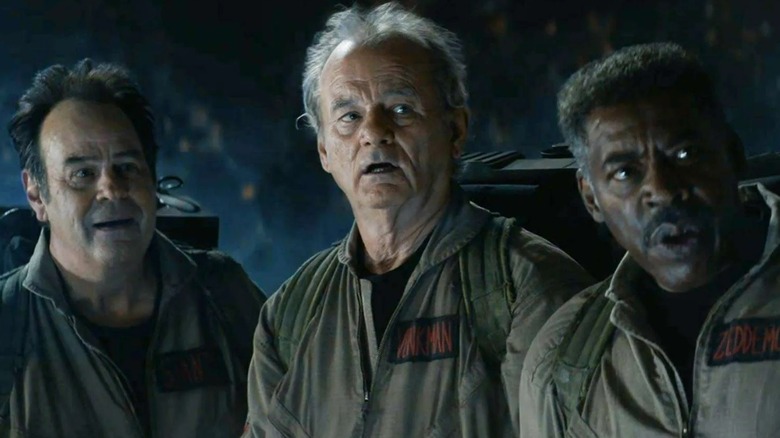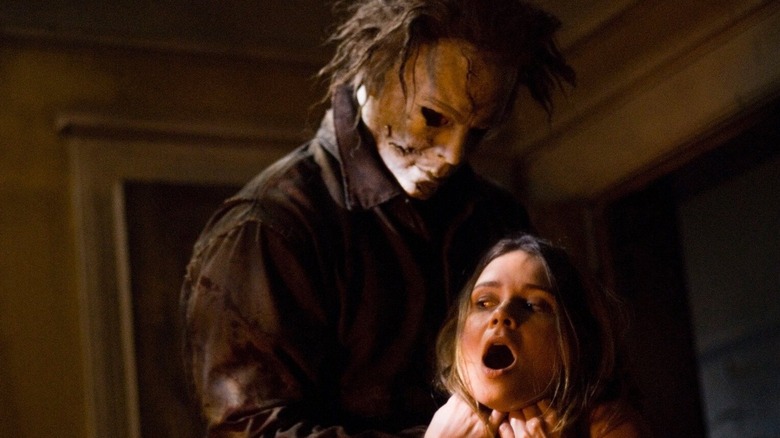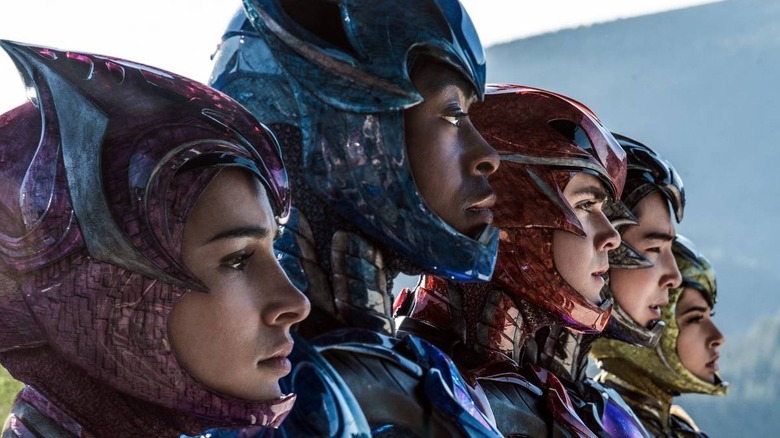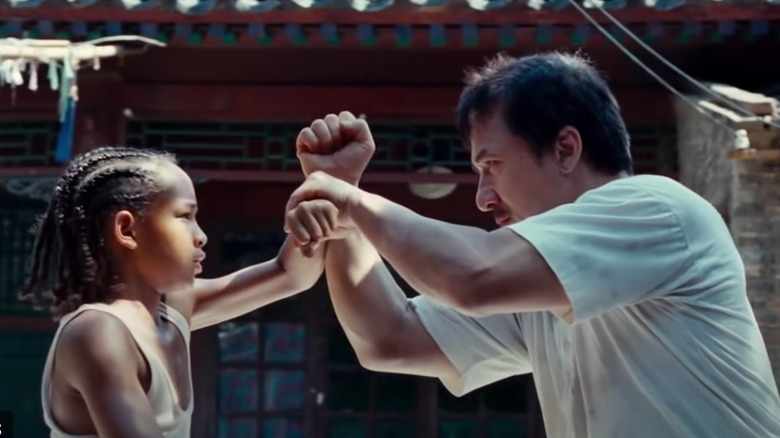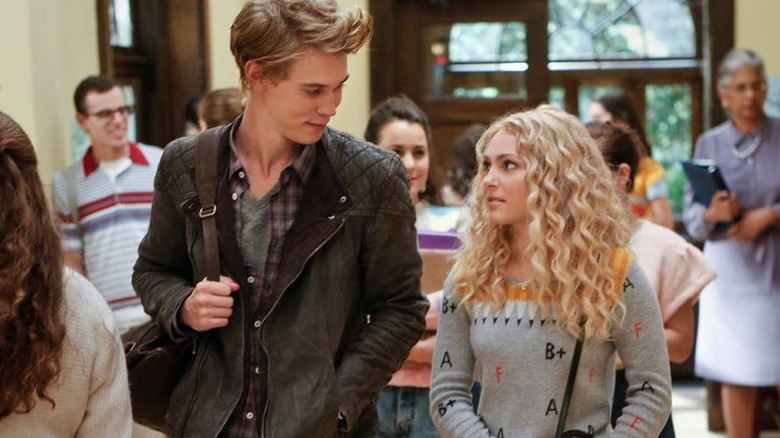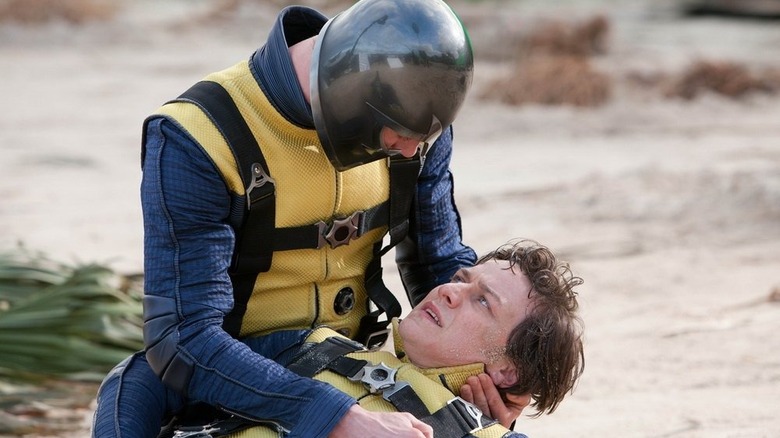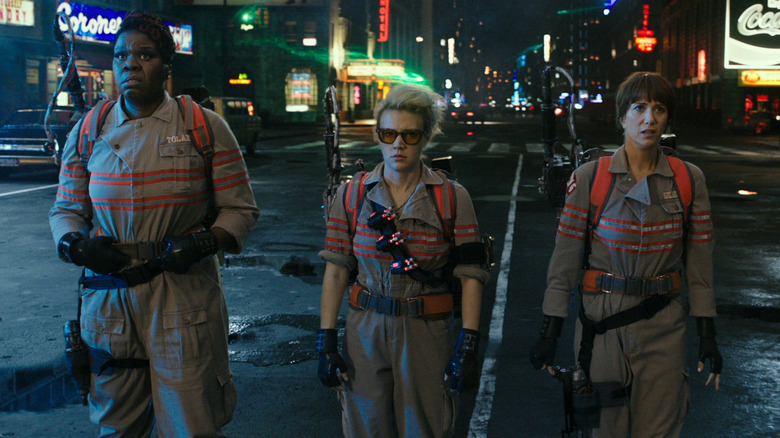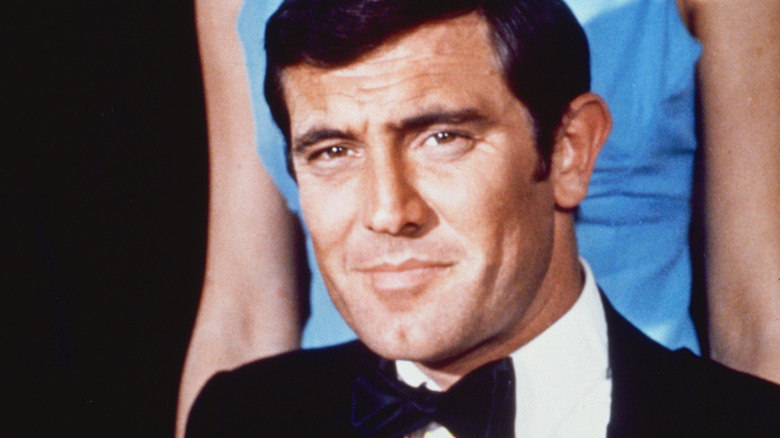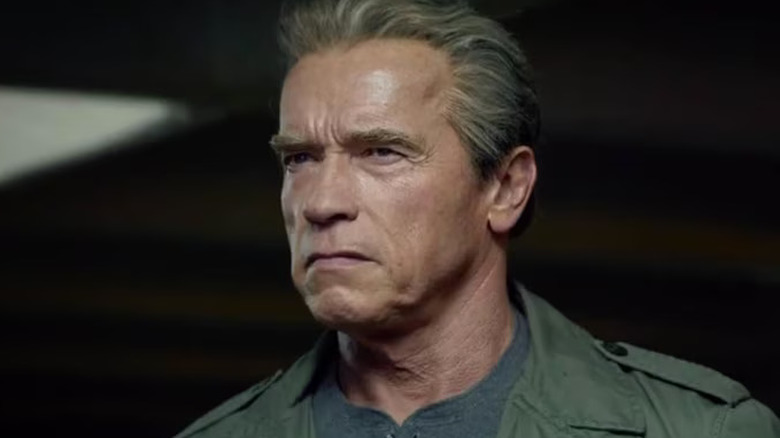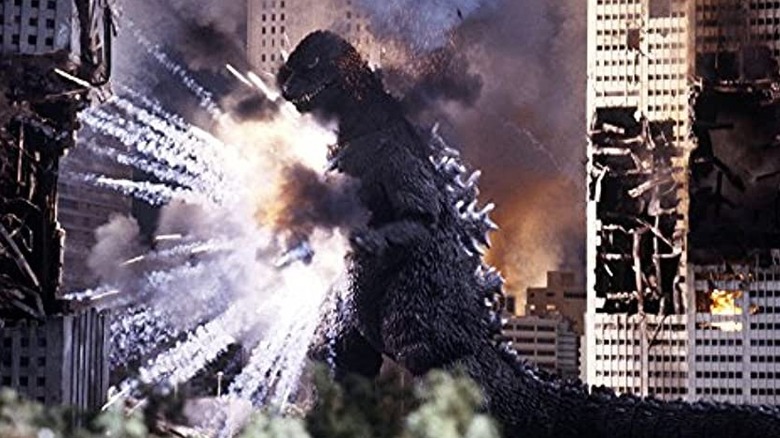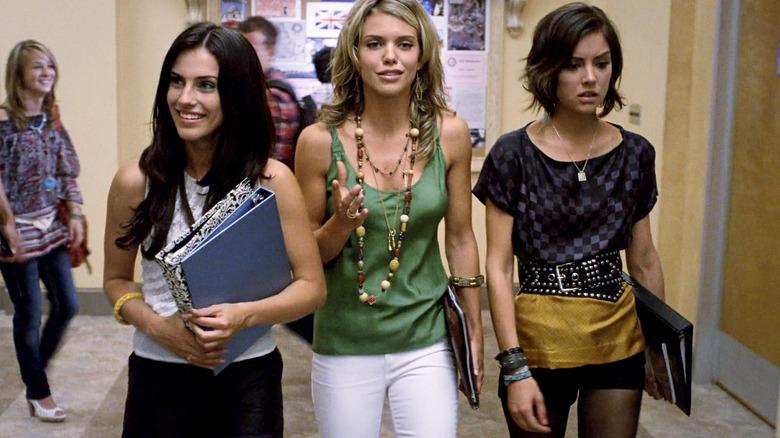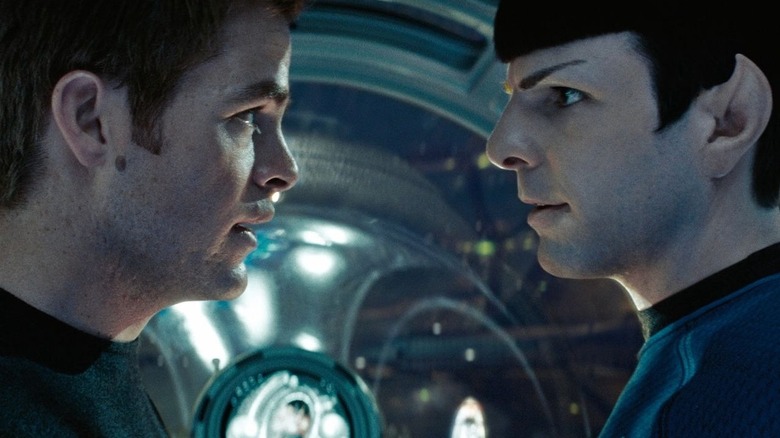Franchises That Went Back To The Original Series After A Reboot Attempt
It needs to be pointed out right at the top that it can be a bit difficult to pin down exactly what constitutes a reboot. Sometimes the terms "reboot" and "remake" are used interchangeably. Various definitions of "reboot" call it anything from a complete resetting of a franchise's canon, to simply returning to a franchise that had laid dormant for a time. For instance, movies like "Mad Max: Fury Road" or "Blade Runner 2049" are classified as reboots simply because it had been so long since the previous entries in their respective series — even though both films are officially considered direct sequels. Sometimes, reboots even have reboots, to make things even more convoluted.
With all that in mind, there is sure to be some debate as to whether all of the examples in this feature are actually reboots, or if they are instead remakes, follow-ups, or something else entirely. But what unites them all is that they were clearly designed to be something of a new starting point for their respective franchises, only for the franchise to then subsequently have new films and or TV shows that instead connected back to the previous universe.
Not all of these examples saw the reboots be failures or have seen the entries that came after pretending the reboot didn't happen — but that is certainly the case for the majority of the entries below. Simply put, sometimes reboots are like New Coke, and fans clamor for a return to the classic taste of the original.
Halloween
The 2022 movie, "Halloween Ends," finally brought closure to the story that began with the original "Halloween" movie back in 1978, with Jamie Lee Curtis's Laurie Strode finishing what Michael Myers started 40-plus years prior. The movie wrapped up what was actually the ending of a trilogy that had begun with 2018's simply titled "Halloween," the first entry in the franchise that Curtis had appeared in since "Halloween: Resurrection" in 2002.
However, that wasn't the last time there was a "Halloween" movie at all. In 2007, the franchise was rebooted with a new origin story for Michael Myers and a new actor to play Laurie with writer and director Rob Zombie's "Halloween." It did well enough to earn a direct follow-up two years later, but Zombie revealed he was done with the franchise after that. A third installment in the rebooted series was still initially announced as "Halloween 3D" to be released just a year later in 2010, but it never ended up happening.
It would be nine years before another "Halloween" movie was released — thus far, the longest stretch of time between two "Halloween" movies in the entire history of the series. When the franchise was finally revived again in 2018, things not only picked up as if the Rob Zombie movies didn't happen, but it also ignored basically all previous "Halloween" movies except for the 1978 original.
Power Rangers
After three seasons of "Mighty Morphin Power Rangers," the overall "Power Rangers" franchise established a tradition that it would stick with to this day: Changing up the cast, setting, gimmick, and or time period of the show every few years. The various series aren't technically reboots since there are references to previous iterations — as well as some shared characters, most notably Tommy Oliver (Jason David Frank) — but the same can't be said for the 2017 theatrical film.
Not only was 2017's "Power Rangers" movie an attempt to do a franchise reboot, but it was also seeking to reboot the "Mighty Morphin" iteration specifically only with new actors in the roles of the rangers and the villains from the original show. It vastly underperformed at the box office, nixing any plans for that version of the franchise to continue on either the big or small screen.
Not only did the "Power Rangers" TV series keep rolling along as if that movie didn't happen, but in 2023, a special called "Mighty Morphin Power Rangers: Once & Always" was released on Netflix. Coinciding with the franchise's 30th anniversary, "Once & Always" brought back several of the original actors and served as a direct canonical follow-up to the original "Mighty Morphin" TV seasons and its 1995 movie.
The Karate Kid
After "The Karate Kid Part III" was released in 1989, Daniel LaRusso's (Ralph Macchio) story was initially brought to an end, but Mr. Miyagi (Pat Morita) eventually found another student to train named Julie Pierce (Hilary Swank), and that was explored in the 1994 movie, "The Next Karate Kid." It's easy to assume that the film was meant to be the start of a new series that would've featured Julie as the protagonist, but when "The Next Karate Kid" was a box office flop, it became a forgotten side story rather than the start of a soft rebooting of the "Karate Kid" series.
Fast forward to 2010, and a more drastic attempt to reboot the franchise came by way of "The Karate Kid." This time, both the protagonist and his sensei had different names entirely, with actor Jaden Smith playing a boy named Dre Parker and martial arts legend Jackie Chan as Mr. Han. A sequel was planned, but after a few years of development hell, it had seemingly shelved indefinitely per an update from Jackie himself in 2017.
The timing of that update was interesting indeed, as only a year later, the "Cobra Kai" TV series debuted and is a flash forward of the "Miyagi-verse" that brought back Macchio as a middle-aged Daniel as well as several of his original co-stars. It even ties up long-dangling loose ends from the original 1984 movie, like what actually happened between Daniel and Ali (Elisabeth Shue) prior to the events of "The Karate Kid Part II."
Sex and the City
The second "Sex and the City" movie was hated by critics and fans alike and felt like a really unfortunate way to bring a beloved franchise to what seemed like its end. Of course, that proved not to be the last time we saw Carrie Bradshaw (Sarah Jessica Parker), Miranda Hobbes (Cynthia Nixon), Charlotte York Goldenlatt (Kristin Davis), and their assorted friends and family — the characters and their original actors were all brought back together for the 2021 sequel series, "And Just Like That..."
But that didn't come before an attempt was made to reboot the "Sex and the City" franchise as a teen series that looked all the way back at Carrie's time in high school. Airing for two seasons on The CW beginning in 2013, "The Carrie Diaries" starred AnnaSophia Robb as a teenaged Carrie alongside future Oscar nominee, Austin Butler, as her main love interest, Sebastian Kydd. The show even depicts Carrie meeting Samantha Jones, though it happened quite differently than the way the original screen version of Carrie described it in "SATC 2." That and many other changes to the established "SATC" canon only served to reaffirm that "Diaries" was a reboot rather than just a prequel.
Reception was fairly lukewarm and ratings didn't necessitate a third season for "Diaries," and it was ultimately decided that the only Carrie Bradshaw that people want to see on screen is the adult version played by Sarah Jessica Parker. Coincidentally, Parker herself wasn't a fan of "The Carrie Diaries" either, telling Net-A-Porter (via US Weekly), "[AnnaSophia Robb] is a lovely girl and I want her to feel good about it, but it's ... odd."
X-Men
Comic book movies have really leaned into the idea of multiverses and alternate timelines in recent years, with rebooted characters like Spider-Man and Batman meeting versions of themselves from previously unconnected film iterations. But there is typically no fully going back once a comic book movie series has been truly rebooted, save for cameos and one-off crossovers.
But Fox's "X-Men" movies played by their own rules. After the original trilogy took a huge dip in quality with the messy, overstuffed "X-Men: The Last Stand," a major franchise refresh was needed. Matthew Vaughn, director and co-writer of "X-Men: First Class," said in an interview with Slash Film at the time, "We're trying to reboot and start a whole new X-Men franchise." Indeed, the movie went all the way back to the 1960s and told a new origin story of how Charles Xavier (James McAvoy) first formed the group of mutants that would come to be known as the X-Men.
But somewhere along the way, what was supposed to be a reboot retroactively became more of an alternate timeline prequel, as the follow-up, "Days of Future Past," brought back characters and their original actors from the previous "X-Men" movies — making it a follow-up to both "First Class" and "The Last Stand" simultaneously. The next movie, "X-Men: Apocalypse," featured Hugh Jackman in an uncredited cameo appearance as Weapon X, still keeping it tied to the original "X-Men" movie franchise rather than it being its own truly separate series as promised.
Ghostbusters
We won't rehash all of the unfortunate ugliness that surrounded the release of the 2016 "Ghostbusters" movie, sometimes referred to as "Ghostbusters: Answer the Call." All we'll say is that a certain segment of the internet had a huge issue with an all-female team and had already made up their minds about the movie from the very first trailer where Kristen Wiig, Melissa McCarthy, Kate McKinnon, and Leslie Jones made their debut as the titular spectral hunters. What's important to note in terms of this list is that the movie was indeed a reboot — confirmed by five actors from the original films appearing in cameos as different characters — and it didn't perform well enough at the box office for it to continue as the new version of the franchise.
Instead, the initial plans for a sequel to "Answer the Call" were abandoned in favor of 2021's "Ghostbusters: Afterlife," which not only brought back the three surviving original "Ghostbusters" actors – Bill Murray, Dan Aykroyd, and Ernie Hudson — to reprise their classic characters but made it well known that it was a canonical follow-up to the original movies in its extremely nostalgia-fueled trailers. And it wasn't just a one-off return either, as the next "Ghostbusters" movie, due out by the end of 2023, is going to be a direct follow-up to "Afterlife" and seems to be bringing the old gang back together one last time.
James Bond
While there are some overlapping elements between the films of various "James Bond" actors, it is generally agreed upon that each stretch of movies starring a specific 007 is its own self-contained era. Some new actor debuts — like 2006's "Casino Royale" — definitely have a more distinct reboot flavor, but it still feels like a new sub-series of the "James Bond" films kicks off every time a new actor orders his martinis shaken, not stirred.
"On Her Majesty's Secret Service" is a unique film for several reasons, not the least of which it is the first of the Eon-produced films to not star Sean Connery as the iconic secret agent. But rather than have that movie be the start of a George Lazenby reboot era, "OHMSS" ended up being Lazenby's sole outing as Bond. However, instead of then going directly into the Roger Moore era, Connery returned once again to play Bond in the next entry, "Diamonds Are Forever." In this way, the original era of 007 movies was revisited one final time following the first attempt to move beyond Connery, and only then could the next true phase of "James Bond" films begin with "Live and Let Die" in 1973.
Interestingly, a version of that sequence of events would happen again a decade later when Connery's non-Eon "Never Say Never Again" would fall between the penultimate and the final official entries starring Roger Moore, which would then give way to the Timothy Dalton era rather than having that one-off bridge the Moore and Dalton eras.
Terminator
The first "Terminator" movie was something of a cult classic, but "Terminator 2: Judgment Day" is a genuine classic that quickly became — and still remains — one of the greatest action movies of all time. But with director James Cameron subsequently turning his attention to massive epics like "Titanic" and "Avatar" that take years and years to make, the "Terminator" franchise had to continue without him. And boy, did it suffer for it.
To be fair, "Terminator 3: Rise of the Machines" wasn't bad. But it was inarguably a step down from "T2," and it would also be the last halfway decent "Terminator" movie for over 15 years. A huge part of the problem was the lack of a consistent creative team for the franchise, with each new installment being picked up by new writers and directors who each tried rebooting a series that didn't need rebooting. "Terminator Salvation" was mostly a soft reboot while still acknowledging the previous movie, but "Terminator: Genisys" billed itself as a reimagining of the events of the first "Terminator" movie while ignoring all subsequent movies and TV shows in an attempt to be a completely new start for the franchise.
In 2019, Cameron finally got involved in the franchise again when he produced and also co-wrote the story for "Terminator: Dark Fate," which took things all the way back to "T2" and picked up the story from there, ignoring absolutely all other "Terminator" media that had been released since.
Godzilla
First things first: this is about the Toho-produced "Godzilla" movies, not any of the ones made in the U.S. Truthfully, it would be a lot easier to discuss the American-made ones as there have only been four of them between 1998 and 2021. On the other hand, Toho's first "Godzilla" movie was released all the way back in 1954, and there have since been over 30 movies either starring or featuring the legendary giant reptile.
The Toho "Godzilla" franchise is divided up into four eras thus far: the Shōwa era (which ran through 1974), the Heisei era ('84 to '95), the Millennium era ('99 to 2004), and the current era, Reiwa (since 2016). While it might seem pretty cut and dry that each new era represents a reboot that stays consistent until that era ends, things are not remotely that simple when discussing the "Godzilla" movies.
Things do start out that way, but when a given era starts to go off the rails a bit, there is usually a course-correct movie that decides to forgo what has been established in that era and instead goes back to and follows up the originals instead. You basically need a Ph.D. in Kaiju film to fully understand and keep track of it all, but just know that there has been a lot of rebooting and subsequent un-rebooting throughout the nearly 70 years of Toho "Godzilla" movies.
90210
The original "Beverly Hills, 90210" was on the air for so long that the stars of the supposed teen drama were all either pushing 30 or were well into being thirty-somethings by the time it wrapped up in 2000. Though it had already spun-off shows like "Melrose Place" and "Models, Inc.," the overall "90210" franchise would get a fresh start with the reboot of the same name that debuted on The CW in 2008.
Though some cast members of the original show — including Shannen Doherty, Tori Spelling, Jennie Garth, and Joe E. Tata – made guest appearances as their original characters, the new "90210" still had reboot vibes. This especially seemed to ring true as all original series cast member appearances stopped after Season 2, and those characters were never mentioned again after that for the subsequent three seasons. But that wouldn't be the last that the world heard from the original cast of "Beverly Hills, 90210" following their exit from the reboot.
In 2019, Fox aired a show called "BH90210" in which most of the main cast members — save for Luke Perry, who was too busy with "Riverdale" at the time of production — played exaggerated versions of themselves as they all reunite to do a fictional reboot of the "Beverly Hills, 90210." It only lasted for one season, but it deserves credit for its unique approach to, and commentary on, rebooting classic TV shows.
Star Trek
"Star Trek" is a particularly confusing case, because there are any number of iterations of the franchise that some people call reboots and some not. Many Trekkies even said "The Next Generation" was a reboot of the franchise after the original series — and right away, "Star Trek" was doing what this feature is all about, as two subsequent films starring the original crew were released following the debut of "TNG."
Another example is the 2009 "Star Trek" movie, which specifically made a point to reboot the continuity of the series while also still acknowledging that the existing shows and movies continue to exist in their own parallel timeline. But it was still clearly meant to be the start of a new, ongoing chapter of the "Star Trek" franchise, though it has since stalled out at only three films — while TV shows that occurred in the original timeline continue to be made.
And, most recently, "Discovery" felt like yet another soft reboot of the franchise, only for it to then be followed up with "Picard" which was built entirely around revisiting the characters and actors from "TNG" and providing closure to that iteration of "Star Trek." The only thing Trekkies debate more passionately than Kirk vs. Picard is what "Star Trek" media released in the last 15 years or does or does not fit into their own personal "Star Trek" canon.
